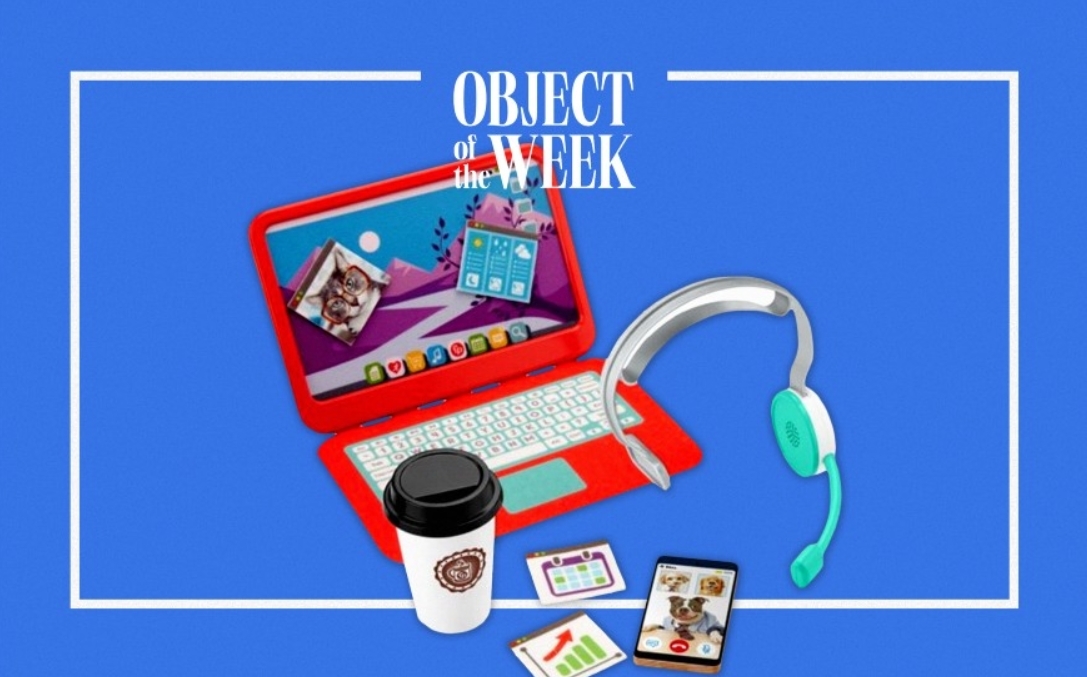Welcome to DU!
The truly grassroots left-of-center political community where regular people, not algorithms, drive the discussions and set the standards.
Join the community:
Create a free account
Support DU (and get rid of ads!):
Become a Star Member
Latest Breaking News
Editorials & Other Articles
General Discussion
The DU Lounge
All Forums
Issue Forums
Culture Forums
Alliance Forums
Region Forums
Support Forums
Help & Search
The DU Lounge
Related: Culture Forums, Support ForumsFisher-Price Has Turned Our Remote Work Hell Into a Toy
”My Home Office” for kids lands somewhere between dark satire and a memehttps://marker.medium.com/fisher-price-has-turned-our-remote-work-hell-into-a-toy-99d6eaa481b4

It looks like a parody, and a rather dark one at that: The Fisher-Price My Home Office play set includes a fake laptop, headset, latte cup, pretend phone, and “4 fabric ‘apps’ that attach to computer screen to ‘work’ on different projects.” It’s intended for pre-schoolers, ages three and up. The obvious takeaway: Once upon a time, children might pretend to be an astronaut or a superhero before the educational system disabused them of all their dreams. Now, apparently, a toy inspired by the Covid-19 remote-work boom, which has converted so many homes into offices and schools, will teach them to just skip ahead and start fantasizing about a soul-draining life of Slack banter and Zoom meetings. This flew so close to satire that truth-on-the-internet arbiter Snopes.com weighed in on the matter, confirming that the eight-piece play set is perfectly real and carries a suggested price of $24.99. In fact, according to its Amazon listing, it’s been available since August. But it’s only in the past week that the kit seems to have made a splash on social media, where it was described as “bleak” and evidence that “we’re all living in hell now.”
Link to tweet
Link to tweet
As Snopes pointed out, fake play set parodies are actually a meme-world trope: “In recent years, Fisher-Price toys have formed the basis of popular online parodies and pastiches, such as ‘Tiny Toker,’ which included toy marijuana paraphernalia, ‘My First Vape,’ and a ‘Happy Hour Playset,’ complete with toy stools, tiny beer bottles, and a kid-sized bar.” Another example: the (fake) “Fisher-Price Work From Home Playset,” which appears to have made the rounds in July. Allegedly aimed at kids ages three and up, it promised a pretend laptop, crying baby, an uncomfortable-looking kitchen table and chair, and a couple bottles of wine. “The perfect toy for 2020 doesn’t exist,” announced a meme-spreader site. That was not true for long. The Toy Insider noted the popularity of the fake-product meme in mid-August and observed: “It’s funny because it reflects the strange limbo we’re living in right now — a pandemic-fuelled era where home is work, home is school, and there really isn’t an ‘off switch’ anywhere to be found.” But then the publication revealed the plot twist: Life appeared to be imitating a rejected Black Mirror episode, and a real version of the same basic idea was now available for purchase.
Sadly, it seems impossible, given the timing, that Fisher-Price literally got the idea from a meme. And it’s not clear how the design and specific components of the actual play set were directly shaped by and meant to respond to work-from-home pandemic culture. (Parent company Mattel did not respond to my inquiries.) Presumably the point is not, in reality, to train kids to join the boundaryless, claustrophobic delirium of the work-from-home, teach-from-home workforce. But what is the point? It turns out that, Twitter wits notwithstanding, a toy that seems like a set of grim training gear for a world without work/life boundaries does have its defenders. Kids love to pretend and enjoy imitating the adults in their lives, Motherly pointed out, and there are plenty of work-related play sets and toys already, so why not have one that normalizes the home office? Several commenters on the economics-focused Marginal Revolution blog made similar points: “Children process complex ideas through play,” one said. Indeed, several reviews on Amazon — where the product has 3.9 out of five stars, based on about 600 ratings — note examples of kids already imitating remote-working parents, often wanting to poke at their actual laptops. (Most of the negative reviews are focused on the physical quality of the objects, not their sociological implications; also, the top positive review involves using the set to distract a cat.)
In other words, maybe this toy merely responds to and formalizes, or just tries to cash in on, behaviour that’s already happening anyway. That’s why my favourite detail of the play set is the image on the wood-block “phone,” which shows what appears to be a conference call among several dogs. Critics quote the first bit of Fisher-Price’s product description — “Better grab a latte to go, that report is due this morning” — as particularly depressing. But it’s worth considering the rest: “and there’s a call with the dog across the street after naptime.” Hey, now — that actually sounds like a pretty good agenda to me! The description adds: “Your pre-schooler is the boss of their own workstation at home, the local coffee shop, or the moon.” Perhaps part of what kids will learn here — and what I’m willing to bet not a few of them are observing first-hand — is how to totally blow off that spreadsheet, goof around, and enjoy some cute dogs every so often. By accident or intent, maybe Fisher-Price’s seemingly weird and dark toy also cues up some of the subversiveness that makes play valuable. If you’ve never learned how to spend some part of your work day on the moon, I recommend you give it a try. Ask a toddler for advice.
snip

